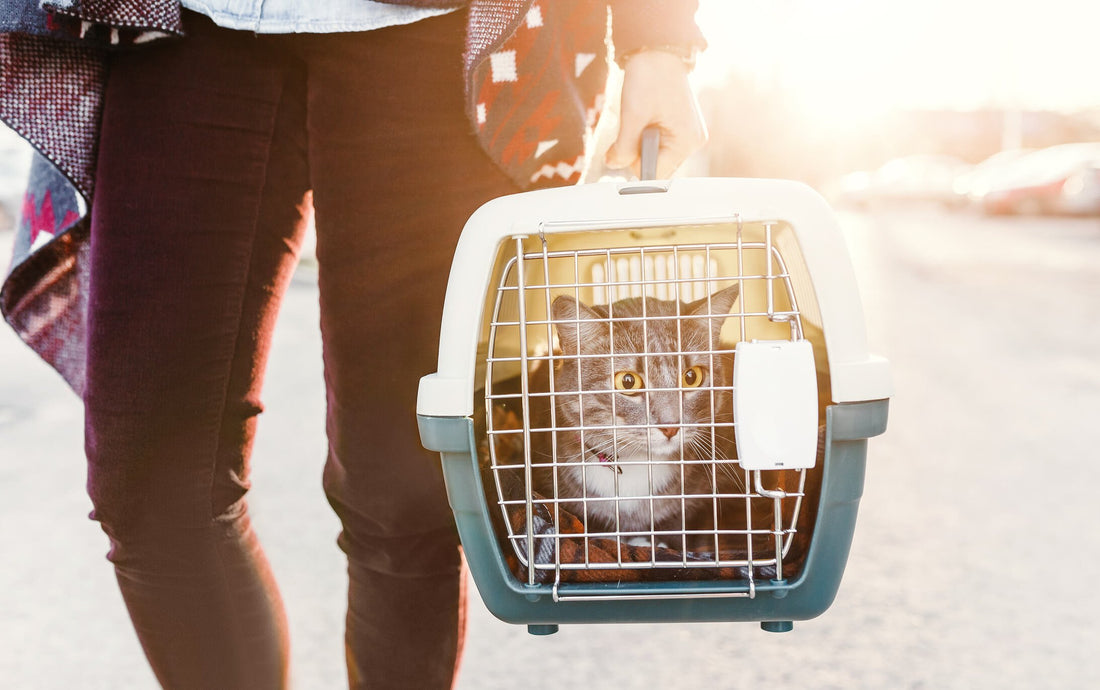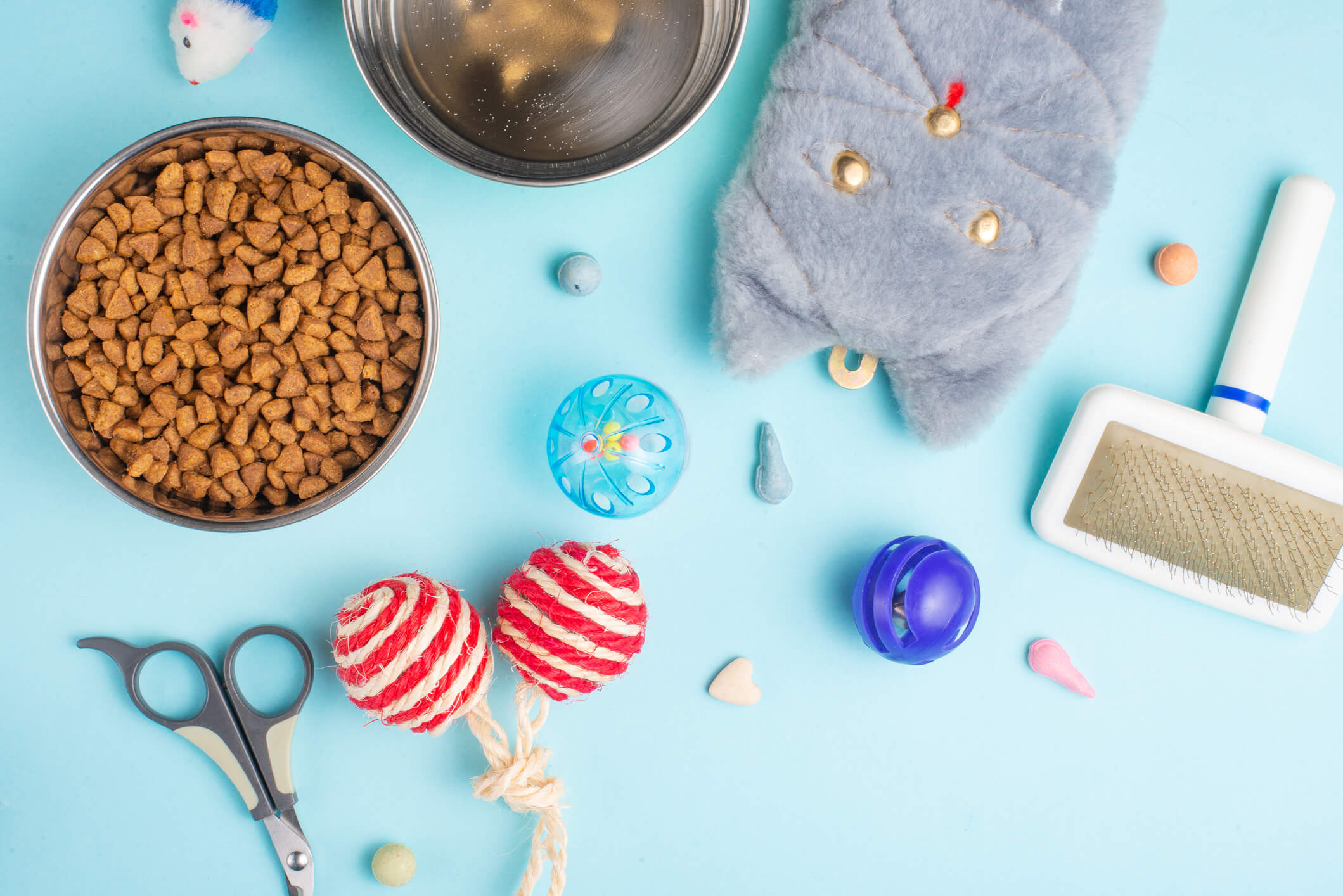
Adopting a Cat? Get Prepared With These 8 Items
With all the excitement that comes with adopting a cat, pet parents might easily forget to kitty-proof their living space first! Cats are pretty low-maintenance compared to dogs, but they still require a few basic necessities. Pet supplies like food, bedding, a cat carrier and supplements will set you up for success.
Once all the paperwork is complete, you’ll get to bring home your new cat! But first, you’ll want to make sure you have all your supplies on hand to ensure a smooth transition.

The following must-have items will help your new furry friend feel right at home:
- Cat carrier: Pet parents need something a little more secure than a cardboard box to transport their new cat from the shelter to home. Before picking up your new kitty, purchase a cat carrier from your local pet store. Pick a carrier that’s big enough for the cat to stand up and move around in. We recommend carriers with a hard exterior shell, since anxious kitty claws can easily tear fabric carriers to shreds.
- The right diet: You can ease your cat’s transition home by feeding them what they’re used to. A lot of change is about to happen, so feeding your cat a familiar food offers some consistency while the rest of their environment is new. Plus, switching foods abruptly can cause digestive upset that’s worsened by stress! Ask the shelter or rescue agency what type of kibble your kitty currently eats and purchase a bag for home. If you want to switch up their food, ask a vet for recommendations and gradually mix the new food with the old until they’re fully transitioned over.
- Food bowls: Don’t just buy a bag of kibble—you’re going to need food and water dishes, too. Choose food bowls that have a weighted bottom so your kitty doesn’t tip them over by accident. You should also choose a material that’s hypoallergenic and easy to clean, like stainless steel, so your cat stays healthy. If you really want to spoil them, buy a drinking fountain that’s constantly churning out fresh filtered water!
- Collar and ID tag: As pet parents get to know their kitties, they’ll learn whether the cat loves to explore the great outdoors or stick to the comforts of indoor domestic life. Whether you’ve adopted an indoor or outdoor kitty, there’s always a chance they could wander too far away from home. Buy a collar and ID tag with your name, address and phone number so a helpful stranger can return your feline if they escape.
- Pheromone spray: Help your cat feel safe in their new home with a pheromone spray. You can apply it to the cat carrier before they crawl inside and even spray other kitty possessions like towels, cat beds and toys. Pheromones signal to your cat’s brain that this new environment is safe, which helps lower their stress. Cat owners can also buy pheromone-infused collars or diffusers that release pheromones into the air at regular intervals.
- Familiar items: To put your kitty at ease, add familiar scents to their new environment. Ask the shelter staff if you can keep items the cat regularly used, like their blanket and chew toys. Place these items in a quiet room or secluded corner of the house so your cat has a safe space that feels like their previous home.
- Litter box: Of course, no pet parent wants their kitty to relieve themselves all over the house! Set up a litter box or two before welcoming your new feline friend home. Cat owners should make sure there’s a litter box for every cat in the family plus one extra. There are many different types of boxes, including plastic boxes, covered boxes and fancy self-cleaning boxes. Cats respond to litter boxes and individual litter types in different ways, so you might need to try a few kinds to learn your kitty’s preferences.
- Toys: Cats need mental stimulation just like us. Under stimulated and bored cats can actually start to get into trouble! Keep a number of fun and safe toys on hand, and rotate your cat’s toys weekly by making four to five toys available at a time. Keep a variety of types easily accessible!
Consider health supplements
A change in environment usually triggers stress, which weakens a cat’s immune system and puts them at greater risk for catching a kitty cold. Keep their immune system going strong with a daily supplement. Supplements are often packed with omega-3 fatty acids, protein, fiber, vitamins, minerals and everything else that goes into a well-balanced diet. As always, speak with a vet before adding supplements to your cat’s diet. They’ll recommend credible brands and the right blend of nutrients for your kitty.
Adoption is an exciting time for both you and your new feline friend. When you adopt a cat, you’re liberating them from the cage and providing them loving home. Don’t worry if your cat isn’t super comfortable right away—they might feel scared, timid or defensive, all of which are perfectly normal. With time, love and a bit of patience, your kitty will be completely at ease in their new home.


